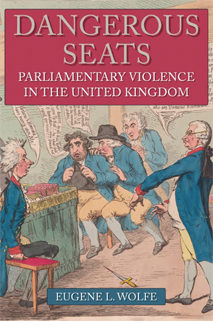Author: Eugene Wolfe
ISBN No: 9781 445689821
Review date: 26/04/2024
No of pages: 392
Publisher: Amberley Publishing
Publisher URL:
https://www.amberley-books.com/dangerous-seats.html
Year of publication: 09/01/2020
Brief:
The book is sub-titled parliamentary violence in the UK, and indeed it covers not only the obvious Westminster but parliaments in Scotland and Ireland, and Stormont in Northern Ireland.
Dangerous Seats has plenty of events to relate – fights, forcible removal from the chamber, attacks by mobs – besides the most startling that even affected the country’s history; such as the assassination in 1812 of the Prime Minister Spencer Perceval, shot in the lobby of the House of Commons.
As the publisher has recognised, Westminster is a lens through which to view British history, and not only the political; consider the Lords and Commons as a workplace, and the people inside it and staff who serve the lords and members of parliament face threats to their safety like anyone else. Security, then, has come on since 1812; note that the murderer of Jo Cox MP did so in 2016 in Yorkshire, far from the anti-ram barriers, screening machines and armed police routinely inside Westminster, who are not (despite the popular belief) good for telling you directions. And the Westminster Bridge terror attacker of March 2017 did not get far inside the gates.
Parliament, then, cannot insulate itself from the outside world; indeed, parliamentarians then were at pains to show that they carried on regardless. And they fret about the physical security that can serve to isolate them inside a bubble as they seek to be open and responsive to their constituents. Yet social media opens not only new ways of communicating with the people but a new front for hate crime and threats.
The author concludes that parliamentary violence is ‘unlikely to disappear any time soon’, and not only because of terrorism. One strand of parliamentary politics is that MPs and lords are competing for influence. Conflict, let alone in the age of honour when men took up duels over slights, is in that sense built into the democratic process. Wolfe also points to working conditions and the ample opportunities to drink, which (as on any British high street) can lead to violence between MPs. In other words, as Wolfe identifies, there is ‘insider’ and ‘outsider’ violence. But he does end with the observation that apathy towards parliament would be even worse than violence. There is something to that, although it strikes a wrong note when you consider the well-documented bile directed towards MPs online and ill-mannered abuse on all sides during the tortured years of Brexit palaver around Westminster.










